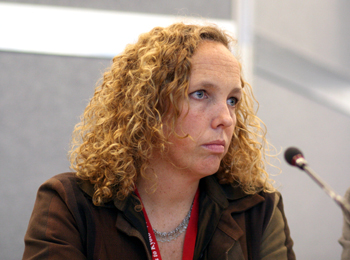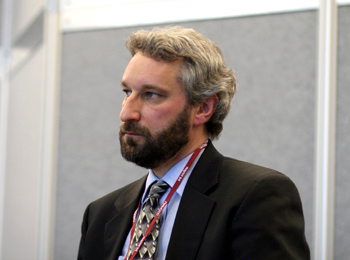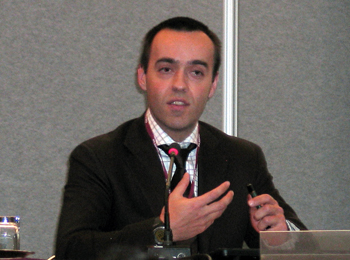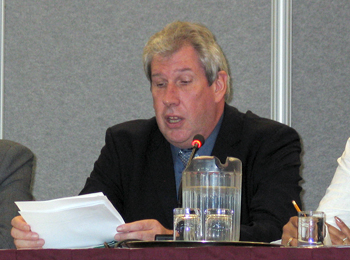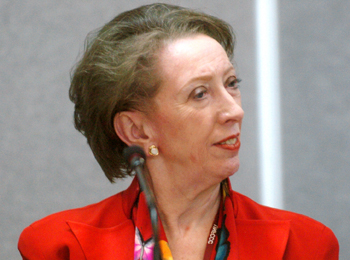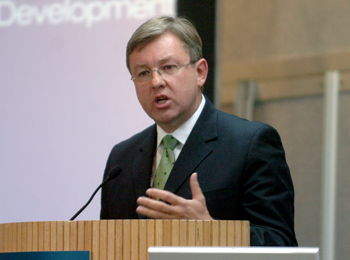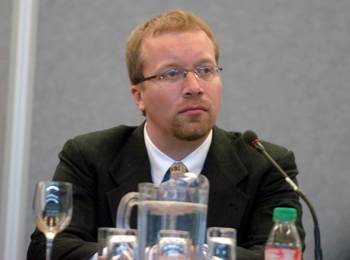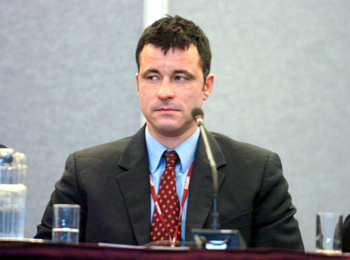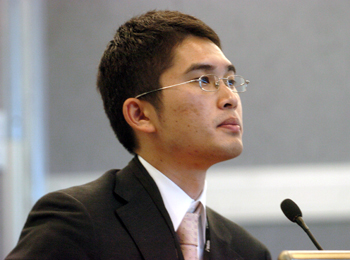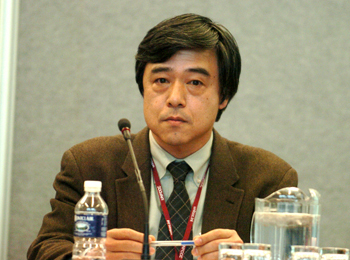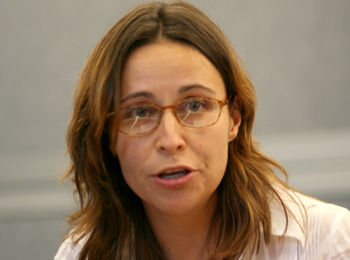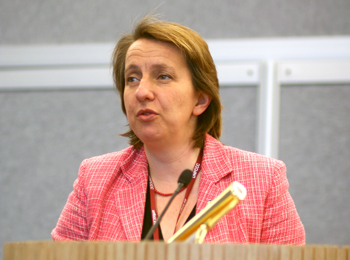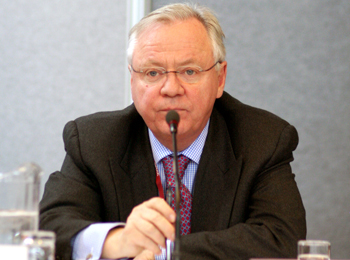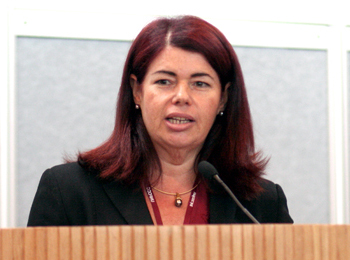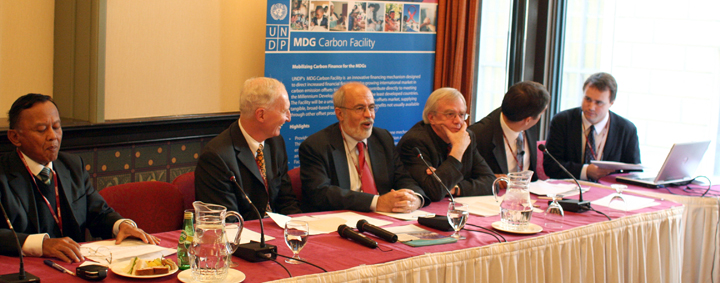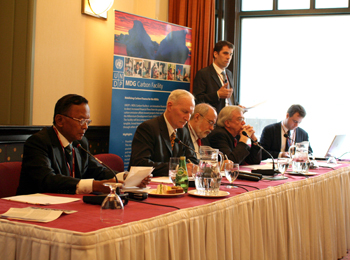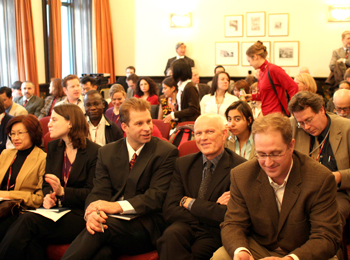 |
||
|
published by IISD, the International Institute for Sustainable Development
in cooperation with the UNFCCC Secretariat. |
|||
|
Special Report on Selected Side Events at COP 11 & Kyoto Protocol COP/MOP 1
|
|||||
| 28 November - 9 December 2005 | Montréal, Canada | |||||
|
Beyond 2012 – a high level forum Presented by Pew Center on Global Climate Change |
|||
|
Eileen Claussen, Pew Center on Global Climate Change, introduced the Report of the Climate Dialogue at Pocantico, which brought together 25 government, industry and NGO representatives to share views and reach consensus on ways of advancing the post-2012 regime. Elliot Diringer, Pew Center on Global Climate Change, provided an overview of the Report of the Dialogue, noting the recognition of the scientific justification for stronger action. He listed objectives of a post-2012 regime, including: engaging major economies; being flexible; integrating development and climate change; addressing adaptation; and being viewed as fair by all parties. Henry Derwent, Department of Environment, Food and Rural Affairs, UK, stated that final decisions on the post-2012 regime must be within the UN context but that dialogues such as those held at Pocantico have created political momentum and will provide useful tools for negotiators. Joanne Yawitch, Department of Environment Affairs and Tourism, South Africa, called for a greater acknowledgement of sustainable development imperatives and broadened participation. She stressed the need for deeper emission cuts, the decarbonization of developing country economies and a greater emphasis on adaptation. Preston Chiaro, Rio Tinto, outlined his company’s emissions reduction activities, including building support for governmental action, supporting technology development and deployment, and setting meaningful internal targets. David Hone, Shell International, underlined the importance of long term goals that create certainty for industry. He said carbon markets are a core element of the response to climate change and that market demand will lead to deployment of existing clean technology. John Wells, BP, emphasized that flexibility and allowing different economies meet their needs is important for the future regime and that progress in emissions reduction can be achieved quickly with the right framework. Jennifer Morgan, WWF International, stated that the future climate regime should include: mandatory caps; the decarbonization of developing country economies; technology deployment cooperation; and the integration of adaptation. She warned against letting countries “cherry pick” among various climate strategies, cautioning this would lead to a race to the bottom. Discussions: participants addressed integrating climate change into development policies, the role of informal dialogues in reaching consensus on a post-2012 regime, the creation of incentives, meeting energy demands and climate friendly coal usage, and the role of governments in technology transfer. |
|||
|
|||
|
National frameworks for the world of work Presented by the International Confederation of Free Trade Unions |
|||
|
Sharon Abreu, Blue-Green Coalition, opened the side event with a song celebrating the alliance of labor and environmental movements.
Robert Sneddon, Trade Union Sustainable Development Advisory Committee (TUSDAC), highlighted objectives of TUSDAC and urged governments to grant trade unions equal standing with NGOs in climate discussions. Elliot Morley, Environment Minister, UK, emphasized the importance of trade unions in policy development, and their ability to disseminate information. Daniel Van Daele, FGTB, said governments and unions have a long tradition of dialogue within his country, and this has extended to climate politics, noting gains achieved in integrating social criteria into the CDM. Atilio Savino, Environmental Secretary of State, Argentina, called for aligning and uniting labor, education, health and climate change interests, which he believes can be mutually supportive. Joachin Nieto, on behalf of the Confederation of Spanish Trade Unions (CCOO), noted that both Spain and Canada are far from fulfilling their Kyoto obligations, and stressed that the social effects of combating climate change must be minimized. Arturo Gonzalo Aizpiri, Environment Ministry, Spain, noted rising population levels and GDP will make meeting Kyoto obligations difficult, and that climate change is as much a socioeconomic problem as an environmental one. Sophie Dupressoir, European Trade Union Confederation, noted a recent study of changing workforce and capacity-building needs in relation to fulfilling Kyoto objectives. |
|||
|
|||
|
United States clean energy and climate change partnerships Presented by the US |
|||||||
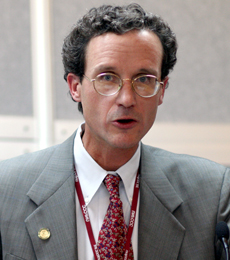 |
David Garmin, US Department of Energy, described public-private partnerships involving US National Laboratories, noting their work towards hydrogen fueled vehicles and zero emissions coal fired power plants producing both electricity and hydrogen.
Bill Wehrum, Environmental Protection Agency (EPA), outlined win-win partnerships including Energy Star, Climate Leadership, and Methane to Markets programmes. Jeffery Sterbo, PNM Resources, described the US Electric Industries Power Partnerships, indicating that they will exceed their 7% reduction target. Jim Lime, Pfizer Inc., reviewed a number of partnerships involving the Business Roundtable, EPA and the World Resources Institute. Wayne Balta, IBM, said all their products meet Energy Star Criteria, and highlighted partnerships with Pew Foundation, the EPA’s Climate Leaders Programme, WRI’s Green Market development programme, and the Chicago Climate Exchange. |
||||||
|
Bill Wehrum, Environmental Protection Agency, US, presented data on US Emissions Reduction
|
|||||||
| Randall Overbey, Alcoa, noted that his company has moved beyond debating climate science and have met their 25% reduction target of 2010 six years early. He expressed concern at the reduced momentum on recycling. | |||||||
|
|
|||
|
The dialogue on climate change, clean energy and sustainable development Presented by the United Kingdom |
|||||
|
Margaret Beckett, Secretary of State for Environment, Food and Rural Affairs, UK, described the Gleneagles G8 Plan of Action, noting its aim to improve energy efficiency and encourage low-carbon technologies. She said the plan established the Dialogue on Climate Change as an informal space to address questions concerning timeframes and sector-specific roadmaps for low carbon technology. Kenneth Newcombe, World Bank, described how the Bank is involved in developing a dynamic, action-oriented investment framework aimed at encouraging low-carbon futures and stressed the need to addresses climate risk and fund adaptation. Marthinus van Schalkwyk, Minister of Environmental Affairs and Tourism, South Africa, stated that the scientific case of climate change has been established and stressed the need for financing adaptation and mitigation activities. José Ramón Ardavín Ituarte, Ministry of Environment and Natural Resources, Mexico, offered to host the 2006 meeting of the Dialogue, highlighting the inclusiveness of the process and its work on best practices and benchmarking policies. |
|||||
|
|||
|
The emerging climate change services sector: a new business constituency Presented by London Climate Change Services |
||||
|
Anthony Hobley, London Climate Change Services (LCCS), said early UK engagement in climate policies has led to the emergence of a vibrant new business sector that could serve as a global model for tackling climate change. Eliott Morley, UK Environment Minister, stressed that governments alone cannot ensure the success of carbon trading, noting that a pro-Kyoto business voice is critical. He emphasized that emissions trading will take on a more global dynamic and highlighted the need to link schemes to achieve a global carbon market. Edwin Aalders, International Emissions Trading Association (IETA), said IETA is striving towards a global network of emissions trading and scheme-linking is necessary to makes this affordable. Mark Kenber, The Climate Group, said business and environmental groups can create effective alliances by understanding what drives each other and building on mutual interests, as a way of driving policy towards a low carbon economy. Marc Stuart, EcoSecurities, highlighted the benefits of being located in London including a supportive national government and its position as the most important center for global emissions trading. Dirk Forrister, Natsource Europe, said he moved to London because of the UK’s policy structure and its vision to create a longterm stable carbon market, noting that other carbon emission trading centers may emerge. Louis Redshaw, Barclays Capital, discussed reasons for entering the emissions market and noted that the Kyoto Protocol will extend the reach of the EU ETS. Discussion: participants addressed the US' absence from the Kyoto Protocol and the technical and economic opportunities offered by emission trading. |
||||
|
|||
|
Japan’s policies and measures to combat climate change-The Kyoto Protocol Target Achievement Plan Presented by Japan |
|||
|
Koike Yuriko, Minister of Environment, Japan, highlighted the Japanese Kyoto target Achievement Plan which sets sector targets, and described a number of policies, measures and campaigns for emission reductions. She outlined numerous innovative energy saving technologies such as the automobile Toyota Prius and a residential fuel cell cogeneration system.
Makoto Kato, Ministry of Environment, Japan, provided an overview of the Japanese Kyoto Mechanisms Acceleration Programme (JCAP), a government support scheme for host countries and Japanese stakeholders to carry out CDM and JI projects. He described the Nubarshen Landfill Gas capture and power generation project in Armenia and a windfarm project in Argentina. Shinichi Ioka, Institute of Global Environmental Strategies, presented a JCAP project component that integrates CDM/JI capacity building. Shigeru Shiotani, New Energy and Industrial Technology Development Organization, Japan, illustrated a second JCAP project component, relating to capacity-building activities in Hebei, China. Discussion: participants addressed additionality issues, CDM project financing, and Japanese policies on hybrid automobiles tax exemption. |
|||
|
|||
|
Climate Change: past and future impacts on water Presented by the Met Office - Hadley Centre for Research and Climate Change |
|||
|
Margaret Beckett, Secretary of State for Environment, Food and Rural Affairs, noted the historical importance of the G8 climate change agreement reached at Gleneagles this year, noting the important role played by the Hadley Centre in establishing the scientific certainty of climate change.
Vicky Pope, Hadley Centre, presented observed climatic changes relative to measurements at the end of the 19th century, noting pronounced Arctic temperature anomalies and concentration of rainfall patterns. She added that anthropogenically-caused increases in river flow and subsequent decreases in Arctic ocean salinity stands to effect the thermohaline cycle and gulf stream. Pope then demonstrated a new technique for tracking tropical storms. She said that 2004 was the fourth warmest year on record; that the ten warmest years have occurred since 1990; and that rainfall and river flows stand to be altered drastically, leading to pronounced drought events in Africa. Debbie Hemming, Hadley Centre, demonstrated future hydrological scenarios using the total river runoff pathway (TRIP) modeling system, which predicts marked changes in global river flows, including a considerable increase in Africa and the boreal region. She explored quantification of uncertainties, and noted decreased transpiration rates in response to increased carbon dioxide concentrations. Discussion: participants discussed the inclusion of soot as a seventh GHG; that the Amazon is drying out faster than predicted, and the unprecedented hurricane activity in coastal Brazil. |
|||
|
|||
|
Regional views on future climate regimes Presented by the International Chamber of Commerce and the World Business Council for Sustainable Development |
||||
|
Bob Page, TransAlta, presented some of the Canadian climate initiatives such as development of offset projects, noting its future plans for renewables and clean coal technology development. Masayuki Sasanouchi, Japanese Motor Association, outlined his association’s Voluntary Action Plan and Future Framework Beyond 2012. Lorraine Stephenson, Origin Energy, Australia, highlighted the Australian commitment to long term emission cuts, and presented an overview of Australian policies and Origin Energy’s initiatives. Joachim Hein, Federation of European Industries, called for meaningful global cooperation that brings big emitters on board and for rendering the CDM and EU ETS fully operational. Kevin Fay, US International Climate Change Partnership, emphasized that a number of emission reduction initiatives led by states, cities and industry already exist in the US. Björn Stigson, World Business Council for Sustainable Development, said the business community needs to better publicize their efforts in climate change abatement. Discussion: participants discussed private sector views on the US position on climate change, and considered nuclear energy as a clean fuel option. |
||||
|
|||
|
UNDP’s MDG Carbon Facility: Delivering Development Dividends from the Clean Development Mechanism |
||||
| At this Side Event, UNDP was joined by leaders and experts from Annex I and non-Annex I governments, multilateral agencies and the private sector to present UNDP's MDG Carbon Facility. This is an innovative mechanism designed to channel increased carbon finance toward projects that contribute directly to meeting the Millennium Development Goals (MDGs) in developing countries -- with a special focus on least developed countries. The Facility will provide a unique product in the carbon offsets market, supplying tangible, broad-based MDG benefits not usually available through other offset products. More information about MDG Carbon Facility.
Speakers: Olav Kjørven, Director, Energy & Environment Group, UNDP announced UNDP’s MDG Carbon Facility initiative which will mobilize carbon finance and direct it towards a range of investments that will yield tangible sustainable development and poverty reduction benefits across a diverse group of developing countries. It will generate Kyoto-compliant Certified Emission Reductions along with MDG benefits and will use a pooling approach to create balanced project portfolios, allowing the Facility to offer a single offset price from each pool rather than project-specific prices. Thus projects that provide significant MDG benefits but often at higher cost can be pooled with lower-cost projects – thus helping UNDP bring in least developed countries, SIDS and other countries who would otherwise be left outside the regular carbon finance market. (Email: olav.kjorven@undp.org, website: http://www.undp.org). Gudmundur Sigurthorsson, Senior Vice President and Director of Climate Change Services, DNV pointed to the innovation of the MDG Carbon Facility to address climate change and poverty reduction together. He recognized that the initiative was designed to engender trust through its risk taking approach and confidence in building partnerships. (Email: Gudmundur.Sigurthorsson@dnv.com, website: http://www.dnv.com). David Runnalls, President & Chief Executive Officer, IISD expressed that a major flaw in the MDGs is the lack of mention of energy or climate. He believed that MDG Carbon Facility will contribute to making the MDGs more realistic. (Email: drunnalls@iisd.ca, website: http://www.iisd.org). Ken Newcombe, Senior Manager, Office of the Vice President, Environmentally and Socially Sustainable Development, World Bank acknowledged the special competency at UNDP to undertake the MDG Carbon Facility. He suggested that CDM may be seen as "anti-poor" because of the high transaction costs and also suggested that the development aspect needs to be engineered into the CDM. The World Bank is prepared to a "buy order" in place for up to US$20m of CDM Carbon transactions. (Email: knewcombe@worldbank.org, website: http://www.worldbank.org). Clifford Anthony Mahlung, Alternate Member of CDM Board, on behalf of Honorable Dean Peart, Minister of Land and the Environment, Jamaica and Chair, G77 and China reaffirmed that SIDS and African countries are under-represented in the CDM; but that the MDG Carbon Facility will provide funds to cover CDM project transaction costs. (Email: metja@infochan.com). Rachmat Witoelar, Minister of Environment, Indonesia pointed to the land use opportunity of providing forests for carbon sequestration. (Website: http://www.menlh.go.id/eng). Ole Moesby, Ambassador and Under-Secretary of State, Ministry of Foreign Affairs, Denmark discussed that CDM may not provide the best means to achieve development objectives. He proposed that ODA funds could be allocated for CDM capacity building and saw the challenge to merge emission reductions with sound business practices. (Email: olemoe@um.dk, website: http://www.um.dk/en). Robert Aisi, PNG Ambassador to the U.N. stated that the MDG Carbon Facility is an innovative approach to make the CDM more relevant. (Email: pngmission@pngun.org, website: http://www.pngun.org). Maqsood Sinha, Executive Director, Waste Concern, Bangladesh presented two case studies for CDM waste management projects in Bangladesh that were supported by the UNDP Thematic Trust Fund resources. (Email: msinha@citechco.net, website: http://www.wasteconcern.org). Janos Pasztor, Coordinator, Sustainable Development Programme, UNFCCC supported this UNDP initiative that will provide innovative financing for CDM activities. (Email: jpasztor@unfccc.de, website: http://www.unfccc.org). |
||||
|
||
|
Click the above button to go back to our ENB main coverage
|
||
|
|
|
|
|
||
|



